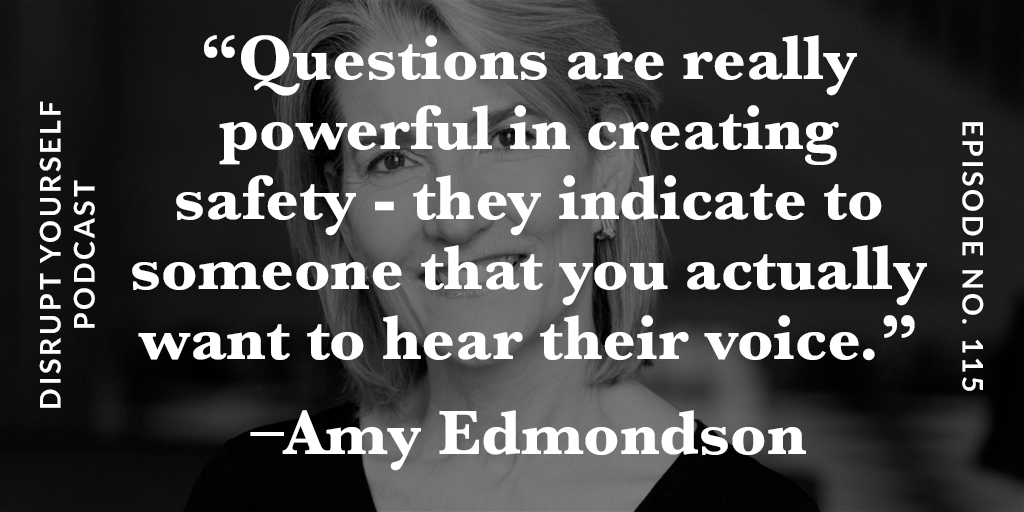I love hearing stories of people being bold.
Amy Edmondson was rapidly approaching graduation from college when she realized that she didn’t know what she wanted to do with her life. She had been a pro at being in school, but hadn’t given much thought to life after school was over.
“I was getting ready to graduate that spring and I sort of took a look at myself and said, “What’s wrong with you? You’re not looking for a job.” And I answered myself. I said, “Well, I’m not looking for a job because I actually really want to work for Buckminster Fuller.”
Buckminster Fuller was an inventor and educator that Amy had long admired, but she had never spoken to him. Taking a complete leap of faith, Amy decided to write and ask for a job.
Miraculously, he wrote back and offered her one.

Now the Novartis Professor of Leadership and Management at the Harvard Business School, Amy studies the dynamics of organizations and how to create a psychologically safe work environment. Over the past 20 years, Amy has shown through her research that teams who are comfortable asking questions and admitting failures work more harmoniously together.
“Questions are really powerful in creating safety because they indicate to someone that you actually want to hear their voice…whether you’re the boss or a team member or anything, every single one of us can practice the opportunity to say things like, what can I do to help? What are you up against? What are your concerns? You know, I, I’m, I’m all ears. I want to hear from you. Is the, is the implicit message with those lovely little questions.”
In her latest book, The Fearless Organization: Creating Psychological Safety in the Workplace for Learning, Innovation and Growth, Amy has created a handy blueprint for organizations who desire to foster creativity and “redefine leadership.” To me, disrupting an organization in such a way is a truly thrilling thought.
And perhaps even a bit bold?
Join us as we discuss why good teams make more mistakes, the psychology of the S learning curve, and the time Amy’s boss wrote a thirteen-page treatise on how Amy was actually right all along.
Listen to the episode in the player above, or download and enjoy it on iTunes. If you’re so inclined, please leave us a review!
Takeaways from this episode:
- Amy didn’t know what she wanted to be “when she grew up,” but she played to her strengths in education and ended up in a career that utilized the talents she was interested in developing.
- “I loved both the being on stage and then the disappearing and not being onstage.” Amy realized she loved teaching by taking a good look at what she enjoyed doing and then charting a career course from there.
- Amy’s love of learning led her to volunteer for a project on mistakes, which ended up being transformational in her career.
- When studying teams in hospitals, Amy initially found that “good groups” committed more mistakes than their peer groups. Rather than assume “good groups” were careless, Amy decided to dig deeper and theorized that “good groups” simply admitted to mistakes more often than other groups. They were straightforward with each other, allowed people to ask for help when they didn’t know how to do something, and were committed to the highest possible standards.
- There are three kinds of failure: preventable failure, complex failures, and intelligent failure.
- “We are all tempted, especially experts are attempted to advocate, you know, to explain one more time while you’re wrong and I’m right. Um, but when we can shift that energy into inquiry, and I think it’s important to point out that the nature of the question is important too.”
- “It’s just as important to grow the people as to grow the organization.” If you want to grow a company, grow the people.
Links Mentioned in this Episode:
- Amy Edmondson – Twitter | LinkedIn
- The Fearless Organization: Creating Psychological Safety in the Workplace for Learning, Innovation, and Growth by Amy Edmondson
- A Fuller Explanation: The Synergetic Geometry of R Buckminster Fuller by Amy Edmondson
- Build an A-Team: Play to Their Strengths and Lead Them Up the Learning Curve by Whitney Johnson
- Download a free chapter from Build an A-Team

